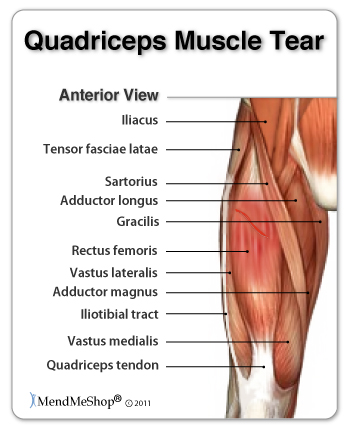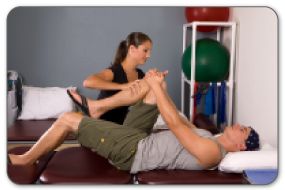Because our hip muscles work so hard in many daily activities, a strain can affect many of the things we do. A muscle strain in the hip means that there is damage to the muscle fibers and possibly their associated tendons in the hip area. This can happen with a seemingly innocent movement, like lifting, changing direction suddenly, and twisting. Many athletes will strain a muscle as a result of their sport, but weekend warriors who are active only occasionally are more vulnerable to muscle injuries, especially if they don't warm up and stretch properly.

There are many muscles in the hip that move down the thigh to the knee and across the abdomen or buttocks: the quadriceps muscles in the front, hamstring muscles in the back, and adductor muscles on the inside. These muscles are responsible for the trunk and legs' multi-directional movements.
The muscles primarily responsible for bringing the leg forward from the hip are the psoas and rectus femoris. The hamstring and gluteus maximus bring the leg behind the body from the hip. The adductor magnus and adductor longus draw the leg to this inside of the body. The gluteus medius, gluteus minimus and tensor fascia lata bring the leg towards the outside of the body. They are also the group of muscles responsible for stabilizing the hip, especially with weight bearing activities. The deep muscles of the hip include the piriformis, the obturator internus, the obturator externus, the gemellus superior, the gemellus inferior and the quadratus femoris.
When straining a muscle in the hip area, it is common that more than one muscle and possibly the associated tendon can be affected. There are varying degrees of hip muscle injuries. Some are mild and can heal well with conservative treatments. Severe muscle injuries, also known as ruptures, are usually a result of a traumatic injury such as a fall or an accident and may accompany a fracture.
This is also known as a 'Grade I' tear. A strain is classified as the overstretching of the fibers of the muscle. Muscle strain feels like discomfort within the hip area as opposed to acute pain. Muscle strains respond very well to conservative treatment protocols.

This is also known as a 'Grade II' tear and is an actual tearing of the fibers in the muscle and perhaps its associated tendon. It would feel like a sharp pain within the hip, and you may hear a tearing sound at the time of the injury. There will be bruising in the torn muscle area in the days following the injury. This grade of strain usually responds quite well to conservative treatments such as a Cold Compress or Ice Pack and a Back/Hip TShellz Wrap®. As this injury is fairly significant, it is very important to REST and ensure you do not worsen the injury with further strain.
This is also known as a 'Grade III' tear. When a muscle ruptures or tears completely, you will feel a very sharp pain within the hip and you may hear or feel a 'pop'. There will be a significant amount of pain when attempting to move the leg and your range of motion will be limited. There will be noticeable bruising, swelling and a change in the appearance of the hip in the hours or days following the rupture. Treatment of a complete tear may require hip surgery to rejoin the muscle tissue at the point of the tear.
We also recommend the use of conservative treatments prior to surgery to minimize tissue damage, resulting in a less invasive surgery - make sure your physician approves of any home treatment protocols you are intending to undergo. Click here to learn about treatment options after hip surgery.
The treatment for hip muscle injures are not much different that dealing with hip tendon injuries. In both cases, one should focus on resting their hip and reducing inflammation to relieve pain.

PT can assist you in stretching the gluteus maximus tendon/muscle and IT band if they are tight. If the gluteus maximus tendon or iliotibial tract have thickened, frayed and/or become inflamed you can treat the injury with conservative treatment methods to heal tough connective tissue such as tendons, muscles and ligaments. Once swelling is reduced with application of a Cold Compress or Ice Pack, treating the area with a Back/Hip TShellz Wrap® will help induce an increase in blood flow while also temporarily increasing the flexibility of soft tissue in the area. This should help alleviate the symptoms of muscle strain quite quickly. In most cases, utilizing home conservative treatments such as a Cold Compress or Ice Pack and the TShellz Wrap®, combined with rest and a stretching regimen will help or -at minimum- reduce the severity of a muscle injury such as muscle strains, muscle spasms or partial muscle tears in the hip.
To learn more about conservative treatments for the hip, go here.
We've helped thousands of people treat their painful injuries and conditions to get them back on the road to a pain-free life!
Click HERE to Go To Our Online Store We take all major credit cards and Paypal.
If you have questions, call our office at 1-866-237-9608 (toll free continental US).
We are currently offering FREE SHIPPING and a 60 day trial period on all our Wraps.
Product Advisors are available 9:00 am to 5:00 pm Eastern Standard Time Monday to Friday.
I want to learn more about Hip Surgery & Post-Surgery Recovery
I want to learn more about Circulation Boost
I want to learn more about Ice & Heat: Which Is Better For The Hip?
I want to learn more about Trigger Points in the Hip
I want to learn more about Hip Surgery: Do I Need It?
During your recovery, you will probably have to modify and/or eliminate any activities that cause pain or discomfort at the location of your soft tissue injury until the pain and inflammation settle. The more diligent you are with your treatment and rehabilitation, the faster you will see successful results!
Please be aware that this information is neither intended nor implied to be a substitute for professional medical advice. CALL YOUR HEALTHCARE PROVIDER IMMEDIATELY IF YOU THINK YOU MAY HAVE A MEDICAL EMERGENCY. Always seek the advice of your physician or other qualified health provider before using any of our outstanding products to make sure they are right for you and your condition or if you have any questions regarding a medical condition. Always see your doctor for a proper diagnosis as there are often many injuries and conditions (some very serious) that could be the cause of your pain.
© 2025 In.Genu Design Group, Inc. Contact Us